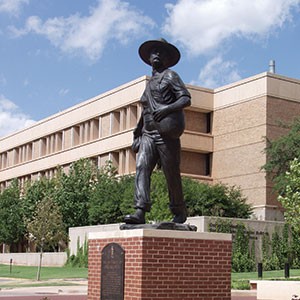TULSA – University of Oklahoma President David L. Boren announced today that Blue Cross and Blue Shield of Oklahoma is making a $41,480 gift in support of the Reducing Health Care Risk Among Uninsured Diabetics Program.
This new program provides much-needed medications, assistance and diabetic supplies to 270 underserved, low-income diabetic patients in the Tulsa community served through the OU School of Community Medicine’s Community Health Longitudinal Clinics and the Heart Improvement Project.
“Oklahoma ranks near the top of all states in the incidence of diabetes among our citizens,” Boren said. “This grant will provide critical help to those who need it most.”
The goal of this new program is to reduce risk and improve health outcomes for low-income diabetic patients by providing additional services and support beyond traditional medical care. Diabetes is a common and treatable disease, and access to medications and supplies for disease management is critical to the health and well-being of diabetic patients.
The Reducing Health Care Risk Among Uninsured Diabetics has four program elements:
1. Dispensary of Hope Access Site: Dispensary of Hope is a charitable medication distributor that connects surplus medications from manufacturers, distributors and providers to pharmacies and clinics that serve the low-income population and uninsured. It also provides discounted diabetic supplies for patients.
2. Prescription Assistance Program Enrollment Assistance: Prescription assistance programs are offered by various pharmaceutical companies to provide prescription medications to low-income and uninsured individuals at no cost or a significantly reduced cost. The application process can often be complicated requiring various forms of documentation from patients needing assistance, including proof of income. Bedlam Community Health Clinics and Heart Improvement Project staff help connect patients with these programs and provide enrollment assistance.
3. Free bridging insulin, blood sugar testing strips and meters: When a diabetic patient is approved by a prescription assistance program for insulin there is an average waiting period of four to six weeks before the medication is received and dispensed to the patient. This component of the program will administer “bridging insulin” to these patients, which means that OU will provide the needed insulin during this waiting period at no cost to the patient. This allows for insulin and related patient education to begin immediately upon diagnosis. As part of this initiative, all patients also will receive a meter and needed glucose strips at no cost to them.
4. Bedlam Charitable Pharmacy: The Bedlam Charitable Pharmacy is responsible for inventory and disbursement of all Dispensary of Hope medications, bridging insulin, glucose meters and strips. In addition, the pharmacy is responsible for patient education related to medications and supplies. It will also serve as a teaching pharmacy staffed by OU students and supervised by OU pharmacy faculty.
“Diabetes crosses all socio-economic boundaries and we are proud to play a part in assisting those who need help accessing diabetic medications and supplies,” said Dr. Joseph Cunningham, chief medical officer and vice president of health care management, Blue Cross and Blue Shield of Oklahoma. “As a health focused company, Blue Cross and Blue Shield of Oklahoma is committed to positively impacting the lives and health of all Oklahomans.”
In addition to support for the Reducing Health Care Risk Among Uninsured Diabetics, Blue Cross and Blue Shield of Oklahoma has also supported the OU School of Community Medicine through gifts for Bedlam Clinics and Community Health Clinics.
Gifts from Blue Cross and Blue Shield of Oklahoma have reached approximately $1 million, making the company a member of the OU Seed Sower Society. A sculpture of the Seed Sower was presented to Cunningham and Ted Haynes, president of Blue Cross and Blue Shield of Oklahoma, at the meeting.



